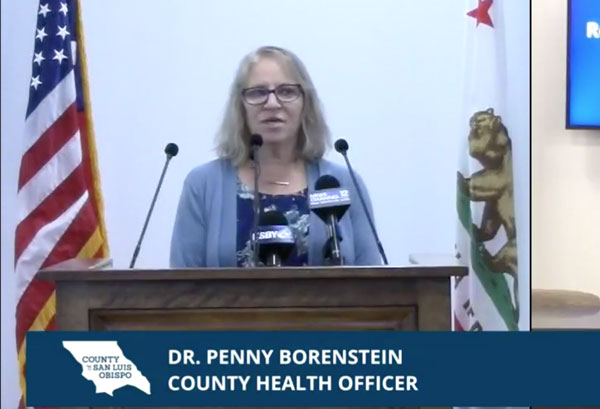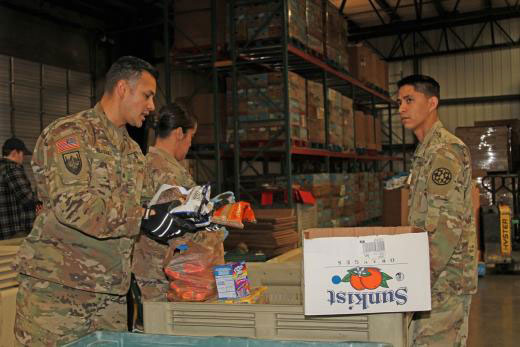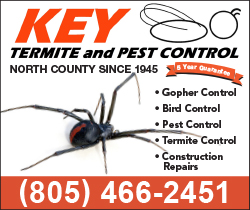COVID-19 update: 33 cases now confirmed in county – see new details

–On Monday at 1 p.m., the County of San Luis Obispo updated the community regarding the COVID-19 pandemic. At this time, 33 local residents have tested positive for the COVID-19 coronavirus. Three local patients have recovered from the virus, one is in an intensive care unit, most are recovering at home.
Distribution of COVID-19 cases in San Luis Obispo County
- North County cases – 12
- Coastal County cases – 7
- San Luis Obispo central cases – 2
- South County cases – 12
Ages of COVID-19 cases in San Luis Obispo County
- Age 0-18 years old – 3
- Age 19-64 years old – 21
- Age 65 years or older – 9
Cases of COVID-19 by status in San Luis Obispo County
- At home – 28
- Hospitalized – 1
- Hospitalized in intensive care – 1
- Recovered – 3
- Deaths – 0
Source of transmission of COVID-19 cases in San Luis Obispo County
- Travel related transmission – 19
- Known person-to-person transmission – 6 (most in households)
- Unknown community-acquired transmission – 3
- Unknown – 5
Cases of COVID-19 by testing laboratory
- SLO County Public Health Lab – 16
- WestPac – 13
- Lab Corp – 2
- Quest – 1
- VRDL – 1
As of Monday afternoon, the county reports conducting 288 COVID-19 tests. An unknown number of residents have been tested by private labs, the county reports.
After releasing the latest statistics, the county held a press conference Monday at 3:30 p.m. at the county’s Joint Information Center at 1133 Kansas Avenue, San Luis Obispo, Calif.
“We do expect to see an increase in cases,” said County Public Health Officer Dr. Penny Borenstein. When will the number of COVID-19 cases plateau or peak? She said her best estimate is that it will be a minimum of weeks before the county reaches a peak in cases.
She said there is a shortage of medical gowns and rising demand for medical equipment. She said health care providers looking for personal protective equipment may call the public health department’s main phone line and request or order supplies.
Four days into the county’s Shelter at Home Order, San Luis Obispo County Emergency Services Director Wade Horton said county residents need to do more to practice social distancing, staying six feet away from other people, and avoid congregating with other family units. The county asked The Land Conservancy of San Luis Obispo County to close the Pismo Preserve because visitors are not minding the social distancing guidelines, he said.
Borenstein added “Why six feet? It is not a magic number. It is the average distance a cough or sneeze goes in terms of the distance.”
Horton said county health inspectors are visiting permitted businesses, such as restaurants and grocery stores, to ensure best health practices are being met.
He said the county is facing a shortage of blood donations. “Please consider giving blood,” Horton said. Click here for information on donating blood.
Additional information provided by the county and state:
County ready to establish alternative care site if hospitals reach capacity
–The County of San Luis Obispo has reached out to leaders from Cal Poly and local hospitals to establish an alternate care site if local hospitals reach capacity.
“Right now, our local hospitals are able to meet the need,” said SLO County Health Officer Dr. Penny Borenstein. “We know things can change quickly with this type of virus—so we’re preparing now to provide care for more people if our hospitals reach their limits.”
If needed, teams will establish an alternative care site at the Cal Poly Recreation Center, which has adequate space plus sufficient electricity and water. The site would serve patients who are ill with COVID-19 if local hospitals reach capacity. This allows local hospitals to expand patient care, as needed.
Engineering teams are developing plans to convert the space for medical use, while logistics teams are working with state leaders to procure appropriate medical equipment. The County of SLO Medical Reserve Corps, a group of trained volunteers who assist public health efforts during times of special need or disaster, will staff the site. The Medical Reserve Corps is currently recruiting: see www.slocounty.ca.gov/MRC to learn more and volunteer.
“We’re acting with the expertise and service of medical specialists, engineers, and emergency logistics teams,” said County Administrative Officer and Emergency Services Director Wade Horton. “The space at Cal Poly is well-equipped and if needed will provide safe and quality care.”
The local health care system is currently meeting demand for care in SLO County. Health officials urge those who exhibit symptoms of COVID-19—such as mild to severe fever, cough and shortness of breath—to stay home, avoid contact with others, and call their health care provider or urgent care clinic if symptoms become severe. Residents should call before seeking medical care to receive safe arrival instructions, if directed to do so. Only go to the emergency room if you are experiencing a medical emergency.
For updates on COVID-19 in SLO County: Visit ReadySLO.org or call the recorded Public Health Information Line at (805) 788-2903. A staffed phone assistance center at (805) 543-2444 is available seven days a week from 8 a.m. to 5 p.m. for questions related to COVID-19.
COVID-19 in California by the numbers
The following numbers from the California Department of Public Health reflect the information received by local health jurisdictions as of 2 p.m. March 22:
- 1,733 – Positive cases
- 27 – Deaths (including one non-California resident)
- 1,709 – Cases not related to repatriation flights
- 120– Travel-related
- 165 – Person to person
- 474– Community transmission
- 950 – Under investigation
- 24 – Cases of positive tests related to federal repatriation flights
- 22 – State and county health labs currently testing
Ages of all confirmed positive cases:
- Age 0-17: 25 cases
- Age 18-49: 837 cases
- Age 50-64: 442 cases
- Age 65+: 415 cases
- Unknown: 14 cases
State awards $100 million to cities and counties for homeless
SACRAMENTO – California has awarded $100 million in emergency grant funding to California counties, Continuums of Care, and the state’s 13 largest cities to help protect the health and safety of people experiencing homelessness during the COVID-19 pandemic.
On March 17, Governor Gavin Newsom signed SB 89, which was approved unanimously by the state Legislature. SB 89 authorized a total appropriation of up to $1 billion to provide assistance to help fight the spread of COVID-19. On March 18, 2020, Governor Newsom’s Administration allocated $100 million in emergency funding from SB 89 to local governments to help protect this vulnerable population and reduce the spread of COVID-19 by safely getting individuals into shelter and providing immediate housing options.
The Business, Consumer Services and Housing Agency’s Homeless Coordinating and Financing Council sent out award letters today.
“The fast action by the legislature in approving this funding has been matched by the swift action taken by our Homeless Coordinating and Financing Council to get this money out the door and to the local jurisdictions where it’s needed,” said Governor Newsom. “This is money that will be immediately available to help those who are homeless – among the most vulnerable to COVID-19.”
California’s 13 largest cities, or cities that are also a county, will receive $42,968,750, while the state’s 58 counties will receive $27,343,750 and California’s 44 Continuums of Care will receive $29,687,500. Allocations can be found here.
The funding is intended for measures to help prevent and contain COVID-19 and can be used for medically indicated services and supplies, such as testing and hand-washing stations. It can also be used for such things as acquiring new shelters, supplies and equipment for emergency shelter operations, increasing shelter capacity, street outreach, and acquiring locations to place individuals who need to be isolated because of COVID-19 illness or exposure.
Update from the Cal Guard’s Humanitarian Response to COVID-19
SACRAMENTO – Responding to California Gov. Gavin Newsom’s alert last week, California Military Department service members from around the state have come on duty to perform vital humanitarian support missions to local and state agencies.
Humanitarian Support Missions Across California
Airmen from the Fresno-based, 144th Fighter Wing, California Air National Guard, deployed their Medical Detachment 1’s Homeland Response Force to support the California Emergency Medical Services Authority. Working alongside their CalEMSA counter-parts, the Airmen will assist at a medical supply warehouse in Sacramento.
Additionally, ten Airmen from the 144th FW deployed to Pacific Grove, California where they are assisting CalEMSA with the care of 19 quarantined passengers from the Grand Princess Cruise ship.
Governor Newsom also activated close to 500 Soldiers with Joint Task Force 115 to support county food banks. Last week, Soldiers and Airmen from the California National Guard (CNG) deployed to support food bank warehouses in Sacramento. On Monday, March 23, the CNG will deploy service members to the following counties to support additional food banks:
Amador County: Interfaith Food Bank, 12181 Airport Jackson Road, CA 95642
Monterey County: Foodbank for Monterey County, 353 W. Rossi Street, Salinas, CA 93907
Riverside County: FIND Food Bank, 83775 Citrus Ave, Indio CA 92201
Santa Cruz County: Second Harvest Food Bank, 800 Ohlone Pkwy, Watsonville, CA 95076; Santa Cruz Flea Market, 2260 Soquel Dr, Santa Cruz, CA 95065
Santa Clara County: Second Harvest of Silicon Valley, 750 Cutner Avenue, San Jose, CA 95125
The soldiers are providing extra help to agencies suffering from a decline in volunteers due to a state-wide stay at home order.
“It’s in these times of crisis that Californians are at their best, coming to the aid of those in their community who are most in need. Food banks provide a critical lifeline for families, and are needed now more than ever,” said Governor Newsom. “Families across our state are suddenly losing work, and millions of Californians most vulnerable to COVID-19 are staying home to protect their health and the health of others. I ask all Californians who are able to join our Neighbor-to-Neighbor campaign to safely assist those in need in your community,” Newsom said.
What is the cause of COVID-19 transmission
–Transmission of the COVID-19 virus appears to be caused by close and prolonged contact, Borenstein said. The greater the illness has affected someone, the more likely they are to transmit it to other people, she said. Asymptomatic transmission, if occurring at all, is a minor proportion of infections, she said. Airborne infection appears to be limited to someone infected who coughs or sneezes and vapor droplets may linger for a short period of time. But neither asymptomatic transmission nor airborne transmission appear to be a dominant means of transmission, she said. The virus does tend to transfer well with human contact, like shaking hands, and linger on hard surfaces, studies have shown.
How can people protect themselves
Every person has a role to play. Protecting yourself and your family comes down to common sense:
- Staying home except for essential activities – “Shelter at home“
- Washing hands with soap and water for a minimum of 20 seconds.
- Avoiding touching eyes, nose or mouth with unwashed hands.
- Cover a cough or sneeze with your sleeve, or disposable tissue. Wash your hands afterward.
- Avoiding close contact with people who are sick.
- Staying away from work, school or other people if you become sick with respiratory symptoms like fever and cough.
- Practicing social distancing.
- Following guidance from public health officials.
What to do if you think you’re sick
Call ahead: If you are experiencing symptoms of COVID-19 (fever, cough or shortness of breath) and may have had contact with a person with COVID-19, or recently traveled to countries with apparent community spread, call your health care provider before seeking medical care so that appropriate precautions can be taken.
San Luis Obispo County’s urgent communicable disease line is (805) 781-4553.
- Follow all local COVID-19 coronavirus news updates
- San Luis Obispo County COVID-19 website – readyslo.org
Scott Brennan is the publisher of this website and founder of Access Publishing. Connect with him on Google+, Twitter, LinkedIn, or follow his blog.










